Site Search
- resource provided by the Forum Network Knowledgebase.
Search Tip: Search with " " to find exact matches.
Grantmaking at the Crossroads is a workbook designed to provide foundations with a new grantmaking methodology that works at the intersection of place, population, and issue. It offers a pathway to greater inclusion of communities that are often excluded or marginalized by foundation funding and enables foundations to maintain their focus and priorities while expanding their reach and effectiveness.
The Grand Rapids Community Foundation and the Kalamazoo Community Foundation volunteered to be laboratories for Grantmaking at the Crossroads and have been critical informants for this workbook. Each of these foundations holds an unwavering commitment to ongoing learning; this publication would not have happened without their support and engagement and the financial support of the Arcus Foundation.
This report from the TCC Group finds that the flexibility, nimbleness, and willingness to collaborate demonstrated by the philanthropic sector over the past year in response to a rapidly changing policy environment could serve as a model for the sector going forward.
Based on interviews with nearly thirty leaders of philanthropy-serving organizations (PSOs), this report found that in the first year of the Trump administration, PSOs and funder collaboratives were called on to keep funders well informed of policy changes. To that end, PSOs have played a critical role in enabling funder learning, dialogue, and action, and have helped accelerate important funder conversations in the areas of diversity, equity, and inclusion; the need to think beyond issue silos; and the foundational benefits of creating space for dialogue across political and ideological divides through nonpartisan civic engagement.
The report also notes that while some funders have remained cautious, taking a "wait and see" approach to how national political changes might affect their grantmaking priorities, a greater number have been moved by rapidly changing policies to consider aligning their "institutional voice" with other grantmakers to maximize their impact.
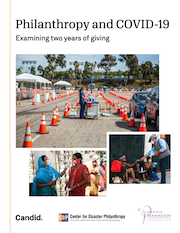
The second year of the coronavirus pandemic began optimistically with the promise of multiple, effective vaccines. However, 2021 proved to be a challenging and complex year. The pandemic continued to put pressure on economies and societies, exacerbating inequities, and hitting poorer, historically marginalized communities the hardest. Through it all, nonprofits continued to play an essential role, providing critical services, trusted information and a variety of resources.
In the report titled “Philanthropy and COVID-19: Examining two years of giving,” Candid and the Center for Disaster Philanthropy examine $1 billion in philanthropic funding for COVID-19-related efforts during 2021 to see how donors responded in the second year of the pandemic.
This report will assist donors as they consider how to invigorate their COVID-19 giving strategy to support equitable, holistic community recovery from the pandemic.
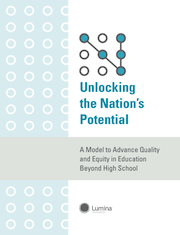
A report from Lumina Foundation and its Quality Credentials Task Force calls for a coordinated national effort to ensure equitable access to quality postsecondary education in the United States.
The report, Unlocking the Nation's Potential: A Model to Advance Quality and Equity in Education Beyond High School (32 pages, PDF), found that the current U.S. system of degrees, certificates, industry certifications, and other credentials lacks a comprehensive definition of quality as well as the kind of up-to-date indicators needed to drive improvements in policies and practices. To help guide efforts that ensure access to high-quality educational opportunities for students of color and advance racially and economically just outcomes, the task force — which includes nearly two dozen education, policy, and workforce development leaders — proposes a model based on a shared understanding of what a quality credential is, as well as institution-based curricular changes and systemic reforms at the federal and state levels.
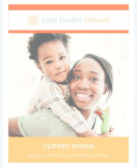
Asset Funders Network’s latest report, in collaboration with the Closing the Women’s Wealth Gap (CWWG) and the Insight Center for Community Economic Development reveals the current economic reality for millennial women and the primary drivers contributing to their wealth inequities. It illustrates how despite important gains in college attendance rates and career opportunities, millennial women’s wealth lags behind that of men. The median wealth holdings of single millennial men is still 162% greater than single millennial women.
While the report confirms that more research is needed to understand the full complexity of issues facing millennial women, this new brief demonstrates how there is a unique opportunity for philanthropy to support and pioneer groundbreaking work that can lead to a more economically just and inclusive society.
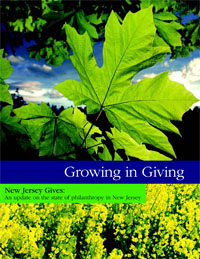 The only statewide study ever published on giving, CNJGs New Jersey Gives report provides a status report on the strength of charitable giving in New Jersey and its influence on the state's economy. First published in 2001 with an updates produced in 2003 and 2005 New Jersey Gives features key statistics on corporate and community foundations, individual giving and more.
The only statewide study ever published on giving, CNJGs New Jersey Gives report provides a status report on the strength of charitable giving in New Jersey and its influence on the state's economy. First published in 2001 with an updates produced in 2003 and 2005 New Jersey Gives features key statistics on corporate and community foundations, individual giving and more.
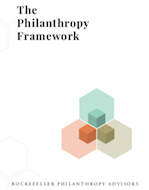
Rockefeller Philanthropy Advisors has released The Philanthropy Framework, a tool for analysis and planning to guide emerging and established philanthropies to better align resources for maximum impact. Created with input from leaders from more than 50 foundations worldwide, the tool seeks to address fundamental changes in philanthropy and the world such as generational shifts in attitudes, massive wealth creation, diversity of capital, new models for impact, and new operating environments among others.
It lays out three core elements for philanthropists to consider when determining how to maximize their impact:
- Charter, the organization’s scope, form of governance, and decision-making protocol
- Social Compact, its implicit or explicit agreement with society about the value it will create
- Operating Model, the approach to the resources, structures and systems needed to implement strategy.
